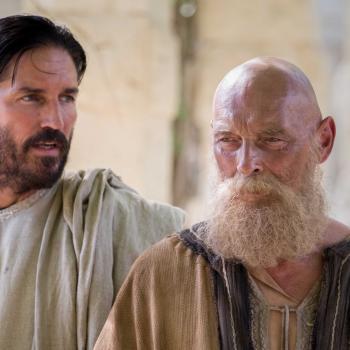Avatar came out on Blu-Ray and DVD last week, so now is as good a time as any to post the following article, which I wrote for the March issue of the Anglican Planet after they asked me to expand on some ideas that I had hinted at in my review for the January issue of BC Christian News:
– – –
By Peter T. Chattaway
James Cameron has given many interviews over the past few months, promoting Avatar and discussing the ground-breaking technology that went into it. He has even defended the film from those who take issue with its politics or its depiction of the military.
But I have yet to see an interview in which anyone encourages Cameron to talk about his religious influences.
This is a shame, as Cameron’s films have often been peppered with religious names, symbols and story elements, and Avatar — which quickly became the top-grossing film of all time worldwide since opening in mid-December and is now nominated for nine Oscars including Best Picture — represents his most explicitly religious film to date.
This is not to say that the film advocates a specific religion, per se, but it does raise questions that are essentially religious in nature, about our relationship to Creation, to one another, and ultimately to some sort of spiritual reality that is higher than us.
The film, which takes place in the year 2154, concerns a crippled former marine named Jake Sully (Sam Worthington) who takes part in a program on an alien moon called Pandora. A human corporation has set up a mining operation there, and a team of scientists have created hybrid bodies called “avatars” — half human, half alien — that allow them to move around in the planet’s atmosphere, which would otherwise be poisonous to them.
The scientists operate these “avatars” by a sort of remote control, projecting their minds into these genetically-engineered bodies — and Jake is initially drawn to the project because it means he will be able to use his legs again, or at least the legs of his “avatar”.
In theory, Jake is supposed to be working for the scientists, whose team leader bears the interesting name Grace Augustine (Sigourney Weaver). But the “colonel” who leads the corporation’s team of mercenary soldiers — a man by the name of Quaritch (Stephen Lang) — is gearing up for war, and so he gets Jake to spy on the native aliens for him.
In turn, one of these aliens — a race of blue, ten-foot-tall humanoids called the Na’vi — is on the verge of killing Jake when a signal from their deity persuades her not only to let Jake live but to save his life from some predatory animals. Before long, this woman, Neytiri (Zoe Saldana), is teaching Jake about the ways of her people; and Jake, for his part, not only falls in love with her but begins to defend her people against the corporation that hired him.
One of the movie’s central conceits is that the Na’vi are “connected” to their planet — and to each other — in a very literal way, through tendrils that emerge from the back of their heads. Through these tendrils, the Na’vi form bonds with the animals they ride and with the luminescent trees that are said to contain the memories of their ancestors.
And one of the key points of the film is that Jake eventually tries to defend Pandora and its natural environment against the mechanized assault of the humans — but he doesn’t do it alone. Instead, he prays to Eywa, the “mother” deity of Pandora, for help — and just when Jake’s efforts seem to have come to nothing, the planet itself rises up and fights back.
The fact that Mother Nature herself becomes Jake’s ally has led some people, such as New York Times columnist Ross Douthat, to say that Avatar is a long “apologia for pantheism”. But I think that line of interpretation may be pushing things just a tad.
Certainly the movie’s title and the fact that the Na’vi are coloured blue would seem to be suggestive of Hinduism, as Cameron himself has admitted. But rather than promote any particular religion, it seems to me that Cameron is using a generic sort of sci-fi mysticism as an allegory for a much broader idea, namely that we need to be stewards of Creation.
Avatar also raises some interesting questions that Christians can appreciate, about the difference between objective study of a belief system and the subjective experience of it.
In one scene, Grace Augustine declares that Na’vi spirituality is “real” and not some sort of “pagan voodoo” because, she says, it can be “measured”. But later on, Grace has an experience that transcends her measurements and makes Eywa real to her.
“I need to take some samples,” she says, almost out of habit, but we know she’s found something better now. Watching this scene, I was reminded of how Thomas Aquinas abandoned his work on the Summa Theologica and said his scholarly work now seemed like “straw” to him, after a mystical experience that he had near the end of his life.
In addition — spoiler alert! — the film even suggests that Grace, like the canonized saint for whom she was named, intervenes with Eywa on behalf of the Na’vi after her death. Yet Eywa remains sovereign; it was her intervention, after all, that drew Jake into the Na’vi community in the first place, thus paving the way for Grace to join them too.
These are just a few of the spiritual mysteries that can be teased out of Avatar, and it is worth noting that, unlike many films in which a member of the establishment finds spirituality among the natives and turns against his former allies, Avatar does not take any shots at “organized religion“. Instead, the film finds common ground between pre-modern and post-modern kinds of belief and pits them against modern materialistic skepticism.
For those who can approach the film on its own allegorical level, and with the right kind of discernment, there is definitely something we Christians can work with here.












